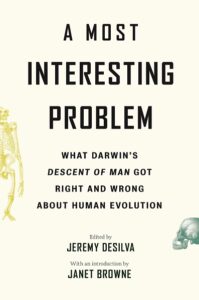 For most naturalists today, Charles Darwin’s On the Origin of Species by Means of Natural Selection, published in 1859, is a cornerstone work. It is also one that, while its propositions caused considerable stir in Darwin’s own time as well as in the decades immediately after his death (particularly in the United States following the turn of the century), now only seems to trouble those outside of natural history circles. His 1871 work The Descent of Man, and Selection in Relation to Sex is another matter indeed.
For most naturalists today, Charles Darwin’s On the Origin of Species by Means of Natural Selection, published in 1859, is a cornerstone work. It is also one that, while its propositions caused considerable stir in Darwin’s own time as well as in the decades immediately after his death (particularly in the United States following the turn of the century), now only seems to trouble those outside of natural history circles. His 1871 work The Descent of Man, and Selection in Relation to Sex is another matter indeed.
Applying the theory of evolution to humans as it does, The Descent of Man also ventures into matters of both sex and race, including possible evolutionary differences pertaining and as a result of each of these – decidedly hot topics in the twenty-first century world. Not surprisingly, given when the book was written, some of the propositions it contains are not in line with many ideas on these matters dominant in our own time, particularly among those with higher levels of education. Consequently, The Descent of Man is far less commonly read or cited today than Origin – not necessarily because some of what it contains has since been significanlty disputed, but, at least in my own opinion, because it is deeply challenging to the ideas many of us now hold, often in ways that are as much propositions of morallity and ethics as they are scientific understandings.
The twelve scholars who have contributed essays to the newly published A Most Interesting Problem: What Darwin’s Descent of Man Got Right and Wrong about Human Evolution are not ones to shy away from such uncomfortable ideas. Edited by Dr. Jeremy DeSilva and with an introduction by Dr. Janet Browne, this important new collection of commentaries on what is perhaps the most challenging of Darwin’s books in our own time, takes up the evidence for human evolution, our place in the family tree, the origins of civilization, of human races, and of sex differences in ways that are both meaningful as well as accessible to those both inside and outside of the scholarly world who are interested in reading and wrestling with this important and core work of Charles Darwin for themselves.
Available from:
If you enjoyed reading this, please consider signing up for The Well-read Naturalist's newsletter. You'll receive a helpful list of recently published reviews, short essays, and notes about books in your e-mail inbox once each fortnight.

